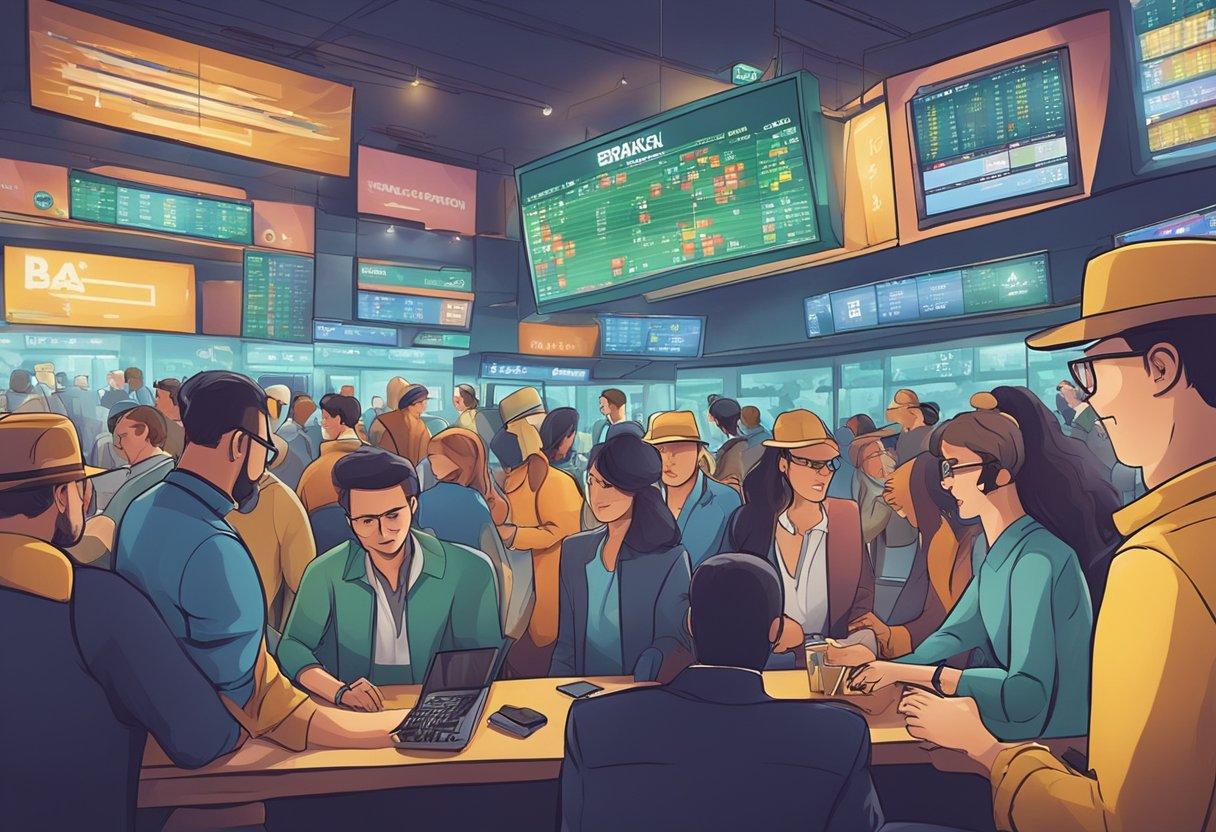Gaming
Gaming in the Metaverse: Using Crypto to Power Up Your Virtual Life

Huzzah, digital warriors and crypto maestros! What if we told you that powering up your virtual gear, skins, battle passes, and entire avatars could be done by simply buying gift cards with crypto?
Say goodbye to bank cards and hello to pure, unfiltered blockchain action. Let’s dive straight into how crypto is fueling the metaverse and why you’re not just playing but banking on pixels that hold real value.
How Crypto Is Integrated into the Metaverse
The metaverse isn’t just another MMORPG, but a living, breathing economy, and crypto is its lifeblood. Blockchain’s decentralized ledger means true ownership of assets like digital land, avatar skins, weaponry, and in-game currency.
Worlds like Decentraland and The Sandbox let you own in-game real estate using tokens like MANA or SAND, trade wearables, and host your own virtual events.
Web3 gaming takes it further with play-to-earn economies. You can actually earn tokens that have real-world value just by logging in and playing—lending, leasing, and even staking assets for passive income.
Cutting-edge titles like Illuvium, Sorare, and Axie Infinity layer in community governance, letting players vote on features and tokenomics. This is more than entertainment, though; it’s financial gaming.
Best Gaming Platforms and Stores That Accept Crypto
Gaming and crypto are becoming increasingly intertwined, meaning more platforms are finding ways to let players spend their coins on virtual entertainment. You’re no longer limited to purely Web3-native games, as mainstream platforms are opening doors, too.
Want to load up your Steam library with crypto? Stock up on Roblox coins? Unlock the latest battle pass on PlayStation or Xbox? It’s absolutely possible, but here’s the thing: not all of these stores let you pay in Bitcoin or Ethereum directly, and that’s where crypto-powered gift cards come into play.
Using gift cards, you can bridge the gap between your wallet and your favorite gaming platform. Instead of worrying about credit cards or bank fees, you’re simply exchanging crypto for store credit, fast and anonymous.
Now, this is exactly where CoinsBee comes in clutch; their platform allows you to buy gift cards with crypto for a massive range of platforms: Steam, Xbox Live, PlayStation Network, Nintendo eShop, Valorant, Roblox, and many more.
The process is dead simple: just choose your gift card, pay with BTC, ETH, stablecoins, or over 200 other supported cryptos, and you’ll get an instant code ready to redeem.
In other words, CoinsBee is your turbo-charged on-ramp to the metaverse and beyond.
Using Gift Cards to Buy In-Game Items, Skins, and Passes
Here’s the death-metal breakdown for power users:
- Hit up CoinsBee, pay with your favorite crypto, and grab a gift card for any major gaming platform;
- Get instant codes via email;
- Redeem fast in your platform of choice: skins, coin packs, battle passes, premium DLC, you name it;
- Flip unused cards on resale markets to make some extra sats.
This isn’t just convenient—it’s the stealth crypto off-ramp nobody’s watching.
Top Cryptos Used in Gaming Ecosystems
Want to know which tokens are running this show? Here’s your loot list:
- Bitcoin & Ethereum: Universal currency accepted by every payment gateway;
- Stablecoins (USDT, USDC): Dodge volatility when you’re stacking buys;
- Altcoins (SOL, DOGE, LTC, MATIC): Supported by CoinsBee’s gateway;
- Native Game Tokens (AXS, MANA, SAND, ILV, SOUL): Required to play, earn, and build in Web3 ecosystems.
Pro Tip: Use stablecoins for spending, native tokens for deep-play ecosystems, and BTC/ETH for general conversions.
The Future of Gaming: NFTs, Avatars, and Beyond
Here comes the next stage, where full immersion meets true ownership:
NFT-Driven Worlds
Every shirt, weapon, mount, or piece of land can be an NFT, completely yours. Take The Sandbox or Illuvium: you buy, you own, you can use anywhere.
Cross-Metaverse Avatars
Your avatar and gear could follow you from one universe to the next. Shared standards like ERC-721 and gaming identity platforms are making that dream a reality.
GameFi& DeFi Hybrid
Your gaming assets can be lent, staked, rented, and yield-farmed. Want to lend your virtual Ferrari NFT to another player? You may earn rental yields, staking rewards, or governance voting rights—that’s what the crossing between game and decentralized finance is all about.
Player-Owned Governance
Game worlds are becoming DAOs: players vote on updates, token economies, and roadmaps. Boss-level stuff, not NPC.
Security & Regulatory Playbook
Crypto-meets-gaming means more eyes from law enforcement and regulators. Gift card systems are often seen as stealth money vehicles, so expect tighter KYC, AML, and limits soon. For now, though, platforms like CoinsBee strike a balance—low-friction, yet future-ready.
Hardcore Tips for Crypto Gamers
- Stack Promos:CoinsBee often drops cashback or bonus deals, so keep your eyes peeled;
- Watch the Rate Spread: Always check crypto-vs-fiat values before checking out;
- Diversify Your Token Wallet: Stable assets for spending, wildcards for specialized platforms;
- Secure and Insulate: Use cold wallets for valuable NFTs and tokens powering your metaverse adventures.
Final Boss Level
If you’re leveling up this digital era, there’s no reason to rely on fiat anymore. The ability to buy gift cards with crypto unleashes the gates to both traditional and emerging gaming realms. You get instant access to loot, skins, games, and immersive virtual land, all powered by blockchain.
From power-loading a Steam wallet to diving headfirst into play-to-earn ecosystems, crypto is not just currency—it’s an enabler, a connector, and your ultimate key to owning the metaverse. Strap in, gear up, and game on as your digital empire awaits.
Gaming
The “Unblocked” Life: Finding Unrestricted Entertainment Online

Living an “unblocked” online life isn’t really about getting around restrictions. It’s about reducing unnecessary friction while staying secure and within the rules. People want entertainment that works smoothly across devices, whether that means streaming a show, playing browser-based games, or accessing platforms that offer Online pokies. On Vegastars, for example, pokies are arranged in clear, organized libraries and can be launched directly through the browser, with no downloads required. The emphasis is on ease and accessibility.
This perspective comes from observing how modern gaming ecosystems function in practice, including browser security standards, casino site architecture, and user experience design. By looking at how access, security, and payment systems intersect in real-world use, the aim is not to encourage rule-breaking, but to explore how open access and responsible digital habits can exist side by side.
What “Unblocked” Entertainment Really Means
When users describe something as unblocked, they usually refer to three things. First, access to content that is not restricted by workplace or public network filters. Second, availability of geo-specific content across different locations. Third, browser-based experiences that run without installation and function even on low-power devices.
The tension sits between ease and control. Networks impose limits for bandwidth, security, and productivity. Users just want smooth access. An unblocked life isn’t about ignoring rules. It’s about selecting platforms that offer wide availability without creating avoidable risk.
Main Channels of Unrestricted Entertainment
Unblocked Game Sites
Browser-based games continue to attract users largely because there’s nothing to install. They load instantly and function on most devices. However, unknown mirror sites can host malicious ads or unsafe scripts.
Streaming and Geo-Specific Content
Content availability often changes by country, leading some users to explore methods for sidestepping those limits. Access might be achievable in certain cases, yet breaching platform terms can carry account consequences.
Digital Casino and iGaming Platforms
For adult audiences seeking casino entertainment, unrestricted access often means choosing reputable digital casinos rather than suspicious clones. Vegastars presents its online pokies, table formats, and live casino interfaces inside a secure, browser-based framework. Access remains flexible across phones and desktops, while the overall ecosystem retains a controlled, professional design.
Risks of the “Unblocked at Any Cost” Mindset
Convenience can sometimes come at a cost. What feels like open access may carry hidden vulnerabilities. The following table maps those risks against more secure approaches.
Risk Area Common Problem Safer Alternative Malware Mirror sites with hidden downloads Use established platforms with HTTPS encryption Data harvesting Proxy sites collecting browsing data Limit permissions and use trusted services Account bans Violating service terms Subscribe to platforms available in your region Productivity loss Unlimited access during work hours Set clear time boundaries Financial exposure Uncontrolled gaming sessions Set deposit and session limits
Imagine opening a random “unblocked games” link during a break at work. Many of those sites are loaded with aggressive pop-ups and embedded scripts that can quietly put a device at risk. Opting instead for a recognized, licensed platform removes much of that risk.
The same logic applies in adult gaming. Accessing Online pokies through a structured environment like Vegastars means using a defined cashier system and clearly organized game libraries, rather than drifting through unverified mirror pages. Even so, platform choice doesn’t replace personal responsibility. Safe, measured use still matters.
Top 5 Principles for Building an Unblocked but Safe Digital Lifestyle
- Choose reputable platforms with transparent ownership and secure infrastructure.
- Favor browser-based experiences over executable downloads.
- Keep devices and browsers updated to reduce vulnerabilities.
- Use strong, unique passwords with two-factor authentication.
- Establish time and budget limits for entertainment activities.
These principles apply equally to streaming services, browser games, and Online pokies platforms.
Concrete Usage Examples
Take someone who plays Online pokies only during planned leisure time. They log into Vegastars from a personal device, use a strong, unique password, and deposit a preset entertainment budget. When the session ends, they log out and close the browser. Simple routine. Clear boundaries.
Consider a streaming viewer who avoids unofficial mirror links and uses licensed platforms in their region instead. That decision by itself reduces exposure to malware and adds a layer of protection around account details. Sometimes discretion isn’t complicated; it’s just consistent habits.
Vegastars and Platform Design
In platforms like Vegastars, the emphasis falls on order and usability. Online pokies and related games are grouped by category, stake controls are visible, and payment functions are embedded into the same control panel. The result is access that feels smooth rather than improvised.
That design hints at how the idea of “unrestricted” entertainment has shifted. It’s not about bypassing controls. It’s about flexible access inside organized, accountable platforms.
Gambling Advisory Notice
Unrestricted access to entertainment does not remove financial uncertainty. Casino games, including online pokies, operate on probability-based systems. Outcomes are unpredictable. An unblocked life must include financial boundaries.
The same applies to subscription services or microtransactions. Convenience can increase spending frequency. Clear budgeting prevents entertainment from interfering with financial stability.
Balanced Access in the Digital Era
An unblocked life online really comes down to balance. People want to move across devices and networks freely, streaming content, playing browser games, or opening Online pokies on platforms like Vegastars. That flexibility matters.
But access without awareness doesn’t work. Cybersecurity habits, spending discipline, and respect for platform rules sit alongside convenience. Entertainment can feel open without becoming careless.
With trusted platforms, clean device practices, and clear personal limits, users can build a digital routine that feels unrestricted yet remains stable.
Gaming
Reddy Book Anna – Top Online Cricket Betting Platform in India

In India, cricket is not a simple sport. It is a feeling that unites individuals regardless of age, geography, and culture. As digital platforms continue to expand, so has the way individuals consume and use cricket. Online access has enabled users today to keep up-to-date, follow matches, and access structured sports-related services. Among the cricket fans seeking some structured and resourceful information Reddy Book Anna is a widely used query in this changing digital environment.
This blog explains the overall idea of online cricket sites, customer expectations, awareness of safety, and the significance of structured systems, without favoring or promoting a particular service.
The Growing Popularity of Online Cricket Platforms in India
Online cricket sites have received a lot of attention in India in the past 10 years. This has been boosted by easy access to smartphones, cheap internet, and real-time updates of matches. Instead, users like simple, transparent, and easy-to-understand platforms.
Searches on reddy books indicate this increasing popularity. Individuals are seeking access as well as clarity, security, and a hassle-free online experience. Speed is no longer the center of attention but rather trust and long-term reliability.
Understanding User Expectations in the Digital Cricket Space
The modern user is an informed and cautious person. They tend to seek transparent procedures, appropriate instructions, and attentive services before interacting with any online service related to cricket. Users are put off by complicated procedures or unfamiliar systems.
Users who are trying to know how digital access functions may also search terms such as reddy anna book cricket id. This demonstrates the significance of systematic information and user-friendly systems that make things simple and enhance trust.
Importance of Secure Access and Responsible Usage
Security is a significant factor in any online platform. At all times, users want their data to be secure and their access to be safe. A responsible platform is concerned about privacy, effective verification, and secure information management.
Searches related to login, like reddy anna 99 login, suggest that users appreciate convenient and secure logins. Easy-to-use login systems with straightforward guidelines make the user more at home and in control of their actions.
Why Transparency Matters for Online Users
Transparency builds trust. When people know how a platform should be used, what to anticipate, and where to get help, then they will remain engaged. Clear policies, visible channels of support, and fair communication are a big boost.
Transparency can be regarded as a determinant in terms of reddy books. Users like platforms that describe processes in a simple language as opposed to complex terminologies or vague terms.
User Support and Digital Guidance
There is no complete digital system without adequate user support. Access, usage, or technical-related questions are frequent, particularly among new users. Fast and responsive service leaves a fine impression and minimizes frustration.
A platform that offers respectful and punctual guidance demonstrates concern for user satisfaction. This is a human way of doing things in an area where people prefer simplicity to complexity.
Reddy Anna Book as a Recognized Name in the Industry
Reddy Anna Book is also ranked among the most popular in this space since it was founded in 2010 and has a structured approach. The platform aims at structured access, transparent procedures, and regularity of customer support.
Having a focus on trusted IDs, secure systems, and 24-hour support, Reddy Anna Book has earned a trustworthy and user confidence reputation. Its history of handling sports IDs and guided access has given many users insight into digital cricket platforms in a better way. This dedication to credibility and openness has helped it become known in India.
Making Informed Choices in the Online Cricket Ecosystem
The digital cricket ecosystem is in its development. It is always advisable that users take time to learn the functionality of platforms, read instructions, and use services that value safety and transparency. Informed decision-making is a way to achieve improved digital experiences and future satisfaction.
The search trend related to reddy books, reddy anna book cricket id, and reddy anna 99 login indicates the necessity of awareness and appropriate use. An informed user will always be more competent in moving around within the online space.
Conclusion
Cricket websites are now an inseparable component of the new Indian sporting experience. Although access is valued, it is even more important to know systems, appreciate transparency, and select structured services. Users can have a comfortable and secure online experience in the constantly expanding world of online cricket by being informed and careful.
Gaming
Top Metrics NFL Bettors Should Know for Smarter Wagering

Profitable NFL betting isn’t about knowing more facts than the next person. It’s about knowing which facts actually predict outcomes versus which ones just make you feel informed. Let’s cut through the noise and focus on metrics that separate winners from donors.
1. Yards Per Play: The Efficiency Truth-Teller
Forget total yardage. A team gaining 450 yards on 90 plays got dominated by one gaining 350 yards on 60 plays. Why? Because 5.8 yards per play destroys 5.0 yards per play regardless of volume.
This metric isolates efficiency from opportunity. Teams averaging 6+ yards per play offensively while allowing under 5 defensively? They win about 80% of games. Sports analytics research from MIT’s Sloan Conference consistently shows yards per play correlating more strongly with winning than virtually any traditional volume stat. It’s the first thing sharp bettors check.
Defensively, yards per play allowed matters equally. Teams surrendering fewer than 4.8 yards per play typically win even allowing 400 total yards, because those yards came inefficiently through lots of plays, minimal progress.
2. Turnover Differential: But Watch for Regression
Everyone knows turnovers matter. The team winning the turnover battle wins roughly 75% of games. The part most bettors miss? Not all turnover advantages persist.
Some teams force turnovers through scheme and pressure and that’s skill. Others benefit from tipped passes bouncing perfect or opponents fumbling unprovoked but that’s luck and it regresses HARD. Analysis of NFL betting metrics reveals which teams sustain turnover advantages through defensive prowess versus those riding unsustainable variance destined to disappoint bettors who overvalue them. Sharp money fades teams whose records significantly exceed underlying metrics due to positive turnover luck.
When regression hits (and it always does), these teams suddenly can’t cover spreads despite looking superficially identical to their earlier selves.
3. Third Down Conversions: The Possession Controller
Want to know which teams actually sustain drives versus relying on explosive plays that dry up against good defenses? Check third down conversion rates.
Offenses converting 45%+ of third downs control games. They maintain possession, wear down defenses, limit opposing offensive opportunities. Doesn’t matter if they lack deep threats, consistent third down execution wins.
Defensively, holding opponents under 35% on third down is massive. Forces punts, creates short fields, breaks opponent rhythm. Teams excelling at both offensive third down conversion AND defensive stops? Often undervalued by public bettors fixated on sexier statistics.
4. Red Zone Performance: Points Versus Field Goals
Two teams reach the red zone four times each. Team A scores touchdowns three times and a field goal once (24 points). Team B settles for field goals all four times (12 points). Same red zone possessions, 12-point difference.
Red zone touchdown percentage separates contenders from pretenders. Teams converting 60%+ of red zone trips to TDs vastly outperform those converting under 45%. It’s the difference between championship caliber and mediocrity, often invisible in yardage stats that look similar.
The same applies defensively. Forcing field goals keeps games manageable even when opponents move the ball. Good red zone defense keeps you in games; bad red zone defense turns winnable contests into blowouts.
5. Pressure Rate Beats Sack Totals
Sacks are great, but pressure rate – how often rushers force hurried throws, quick releases, QB movement – correlates way stronger with defensive success than sack totals.
A team generating pressure on 30% of dropbacks disrupts offenses even recording just two sacks. Pressure creates mistakes: bad throws, coverage sacks, intentional grounding, fumbles. Conversely, teams allowing high pressure rates struggle regardless of QB mobility. You can’t scheme around constant pressure.
6. Time of Possession Requires Context
Time of possession sounds meaningful but context determines whether it indicates strength or weakness.
Winning time of possession while losing the game? That usually means you fell behind early and opponents abandoned the run. The stat reflects the scoreboard, not dominance.
Winning both times of possession AND the game demonstrates offensive efficiency maintaining drives plus defensive stops. That’s sustainable, predictive performance worth backing.
7. Special Teams: The Hidden Yardage
Special teams get ignored, but field position differences compound significantly. A team averaging five yards better starting position per drive essentially gets 60 free yards per game across 12 drives.
Punt and kickoff coverage, return efficiency, field goal accuracy all contribute beyond statistical visibility. Browser gaming communities tracking competitive advantages show how unblocked games and accessibility platforms understand that seemingly minor operational edges compound over time; the same principle applies in football where special teams excellence creates cumulative advantages.
8. Weather Affects Totals More Than Spreads
Heavy wind doesn’t necessarily help underdogs, but it almost certainly lowers scoring. Wind above 20mph kills passing and reduces field goal range. Rain impacts security and kicking. Snow? Forget it.
Sharp totals bettors monitor weather obsessively, identifying games where conditions suggest significant scoring deviations from posted numbers.
9. Situational Trends Matter
Teams perform differently in divisional games versus conference matchups versus cross-conference. Performance after byes varies wildly by coaching staff. Primetime separates clutch from frauds.
Track these patterns. Markets don’t fully price situational performance differences, creating exploitable edges.
Putting Metrics Together
None work in isolation. Profitable betting requires synthesizing multiple statistics, weighting appropriately based on context, and comparing your assessment against market lines.
You’re not trying to predict outcomes perfectly because this is impossible. You’re identifying games where your analysis diverges enough from public perception to create positive expected value. Do that consistently, and math handles the rest.
-

 Finance3 years ago
Finance3 years agoProfitable Intraday Trading Advice For Novices
-

 Gaming2 years ago
Gaming2 years agoPixel Speedrun Unblocked Games 66
-

 Gaming3 years ago
Gaming3 years agoSubway Surfers Unblocked | Subway Surfers Unblocked 66
-

 Internet3 years ago
Internet3 years agoWelcome to banghechoigame.vn – Your One-Stop Destination for Online Gaming Fun!
-

 Gaming3 years ago
Gaming3 years agoMinecraft Unblocked Games 66 | Unblocked Games Minecraft
-

 Gaming3 years ago
Gaming3 years agoGoogle Baseball Unblocked | Google Doodle Baseball Unblocked 66
-

 Internet3 years ago
Internet3 years agoPremium Games Unblocked: Unleash Your Gaming Potential
-

 Gaming3 years ago
Gaming3 years agoTunnel Rush Unblocked | Tunnel Rush Unblocked 66




























